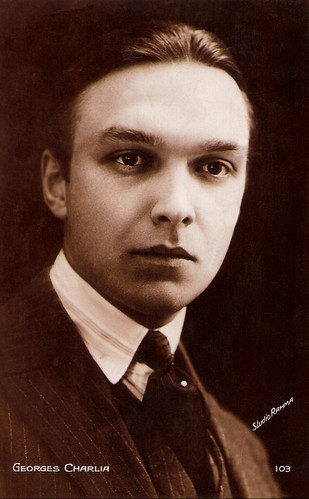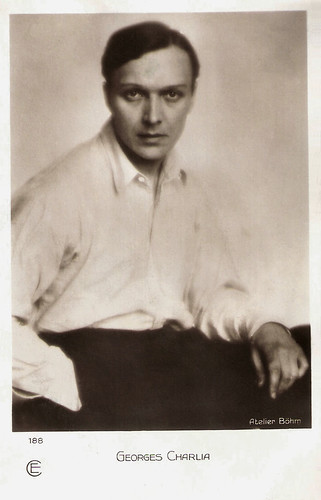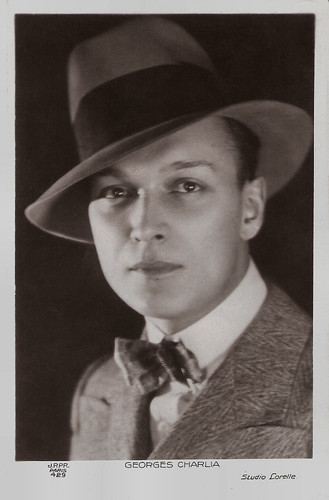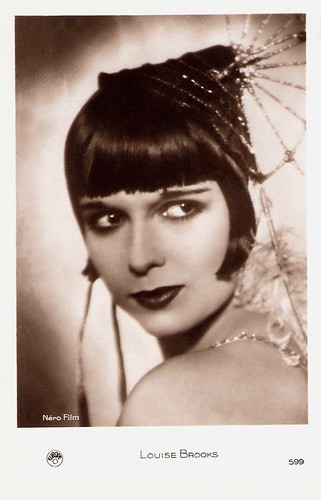
French postcard by Cinémagazine Edition, no. 103. photo: Studio Rahma.

French postcard by Cinémagazine Edition, no. 188. photo: Atelier Böhm.
Sweet-natured sailor
Georges Charlia was born Georges Charliat in Paris, France in 1894.
He made his film debut in Germaine Dulac’s silent film Gossette (1923) with Régine Bouet. Then followed a part in another classic of the silent cinema, La belle Nivernaise/The Beauty from Nivernais (Jean Epstein, 1924) with Blanche Montel.
Charlia also played the lead in Epstein’s La goutte de sang/The Drop of Blood (Jean Epstein, Maurice Mariaud, 1924). The film was started by Jean Epstein, but Maurice Mariaud took it over and modified the project. In the Guy de Maupassant adaptation Pierre et Jean/Pierre and Jean (Donatien, 1924), he appeared with Lucienne Legrand. Le train sans yeux/Train Without Eyes (Alberto Cavalcanti, 1927) was a Louis Delluc adaptation in which he co-starred with Hans Mierendorff, Gina Manès and Hanni Weisse.
He also appeared in Alberto Cavalcanti’s drama En rade/Sea Fever (Alberto Cavalcanti, 1928). At AllMovie, Hal Erickson reviews: “Catherine Hessling, better known to film enthusiasts for her work in the early Jean Renoir silents, stars as a seaport barmaid who falls in love with sweet-natured sailor Georges Charlia. When Charlia unaccountably disappears one day, Hessling is plunged into the depths of melancholia. Her sad story is counterpointed with the bizarre behavior of the local laundress' lazy, near-moronic son (Philippe Heriat), who dreams of a life at sea. Although well photographed on genuine locations, Sea Fever proved confusing to many non-French filmgoers.”
Charlia starred in a few German films, including Ritter der nacht/Knights of the Night (Max Reichmann, 1928) co-starring La Jana. In that same year, he also played in the drama L'équipage/Last Flight (Maurice Tourneur, 1928) starring Charles Vanel. One of his last silent films was Prix de beauté/Beauty Prize (Augusto Genina, 1930) in which he was the lover and murderer of Louise Brooks.

French postcard by J.R.P.R., Paris, no. 429. Photo: Studio Lorelle.

Louise Brooks. French postcard by Europe, no. 599. Photo: Néro Film.
Trapped in a cave
George Charlia made the transition to sound film with Vacances/Holidays (Robert Boudrioz, 1931) with Florelle and Lucien Gallas.
He reunited with Gina Manès to co-star in L'ensorcellement de Séville/The Charm of Seville (Benito Perojo, 1931), Pax/Peace (Francisco Elías, 1932) and L'amour qu'il faut aux femmes/The love which is necessary to women (Adolf Trotz, 1933).
In Germany, Charlia played a supporting part in the classic anti-war drama Kameradschaft/Comradeship (Georg Wilhelm Pabst, 1931). Hal Erickson at AllMovie: “Kameradschaft is set in a mining community on the French/German frontier, where several French miners are trapped in a cave-in. Their only hope for rescue lies in a long-abandoned underground tunnel, buried since the First World War. Ignoring the ethnic and political differences that have long separated the two countries, a group of German miners pick their way through the old tunnel to save the entombed Frenchmen. (…) Ironically, the German public, whose decency and humanity is celebrated in Kameradschaft, tended to avoid the film.”
Charlia's last films were the Belgian-Dutch coproduction Jeunes filles en liberté/Young Girls in Freedom (Fritz Kramp, 1933), and L'enfant de ma soeur/The Child of my Sister (Henry Wulschleger, 1933).
Why his film career stopped after only ten years is not clear. Wasn’t his voice soundproof? Did he lose his interest in the cinema after the silent avant-garde cinema had dwindled away? We only know that Georges Charlia died in 1984, in his hometown Paris. He was 89.
Scene from Prix de beauté/Beauty Prize (1930). Source: TheStat01 (YouTube).
Sources: Hal Erickson (AllMovie), James Travers (Films de France), Wikipedia, and IMDb.
This post was last updated on 17 September 2023.
No comments:
Post a Comment